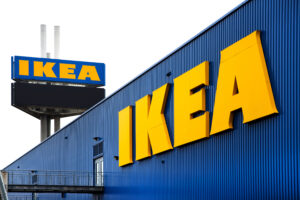In today’s dynamic world, companies are constantly looking for new ways to stay competitive and meet the changing needs of customers.
One of the successful business decisions adopted by many European companies is the transition from retail to a service model. The transition from retail to service can be realised in different ways, but in general it involves shifting the focus from selling goods to providing customers with additional services and value.
Here are some examples of successful transition to a new business model among European companies that emphasise the importance of adaptability and innovation in today’s competitive environment:
1. IKEA
Swedish furniture giant IKEA is known for its affordable and stylish home furnishings. In recent years, IKEA has expanded its offerings beyond selling furniture. Recognising the growing demand for customised home solutions and the rise of digital platforms, IKEA has revamped its business model by offering virtual design consultations, delivery services and furniture assembly. IKEA became not just a furniture shop, but a complete home furnishing solution, which significantly increased its appeal to customers.
2. AUTODOC
At a time when the automotive industry is undergoing a transformation driven by digitalisation and changing consumer behaviour, Autodoc, a German online auto parts retailer, has expanded its services to include online diagnostics, virtual maintenance tutorials and mechanic services. Understanding customer needs, AUTODOC is shifting its business model, by including comprehensive car maintenance services. This strategic decision not only increases customer satisfaction, but also strengthens AUTODOC’s position as a one-stop centre for all automotive problems.
3. Nespresso
Nespresso, a subsidiary of the Swiss company Nestlé, has revolutionised the coffee industry with its elegant coffee machines and premium capsules. Nespresso initially focused on retailing its products through traditional channels, but by moving to a subscription-based service, Nespresso has strengthened long-term customer relationships and secured a stable revenue stream. Nespresso’s subscription model offers customers the convenience of regular coffee delivery according to their preferences, as well as exclusive benefits such as coffee machine upgrades and additional accessories.
4. H&M
Faced with fierce competition and changing consumer habits, Swedish fashion retailer H&M has rethought its business model. Recognising the growing demand for sustainable fashion and personalised shopping experiences, H&M invested in technology to offer personalised style advice and clothing rental services. This strategic shift not only attracted environmentally conscious consumers, but also helped to increase brand loyalty and highlight H&M clothing in a crowded market.
These examples demonstrate how shifting from a retail to a service model can help European companies stay competitive and grow in a changing market environment. By shifting from traditional retail models to service-oriented approaches, these companies have not only met the changing demands of consumers, but also ensured their sustained growth in the digital age. The key to success in such a transformation is a deep understanding of customers’ needs and the ability to offer them valuable and innovative services.
Read more:
Examples of successful business solutions of European companies
















